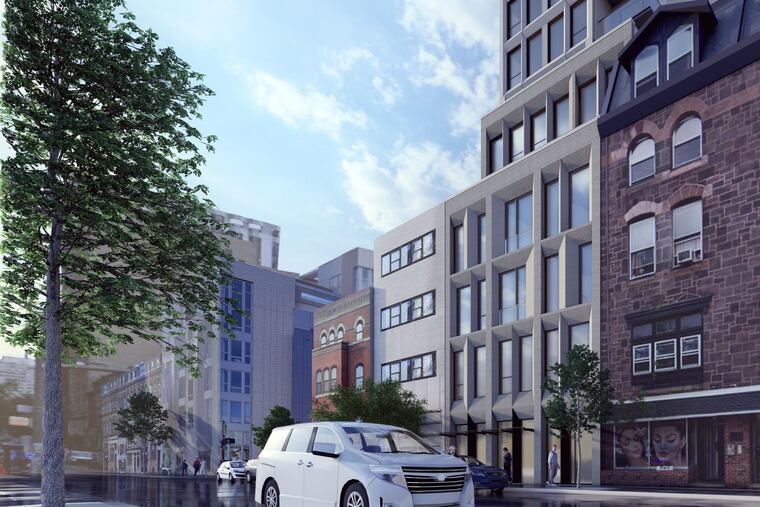10-story condo building proposed amid townhouses on Walnut Street
“There’s a market for a product that’s not typically Philadelphia, that’s more sophisticated," the architect says.

As residential real estate interest in Center City Philadelphia continues unabated, developers are looking for ways to add density in the midst of streets lined with historic townhouses.
Despite a crown of skyscrapers and a smattering of high-rise apartment buildings, most of Center City’s housing stock is still rowhouses. They may be taller and wider than their counterparts in Kensington or South Philadelphia, but they are consistent with the design, look, and architecture in the rest of the city.
Now developers are trying to add density to this historic streetscape, within the confines of narrow rowhouse lots.
“Center City has become very popular, very desirable, and we are getting a lot of people coming in from New York and other places,” said Sergio Coscia, principal with the CosciaMoos architecture firm in Philadelphia. “There’s a market for a product that’s not typically Philadelphia, that’s more sophisticated.”
Coscia’s firm is trying to convince the Philadelphia Historical Commission to allow the construction of his firm’s design for a 10-story, 29-condo building at 2204 Walnut St. The adjacent buildings are slightly less than half the size, although there are other tall multifamily buildings on immediate blocks around the site.
The development, from Cal Leslie’s Flamingo Bay Investments, fits the zoning for the parcel and will not need a variance. But it lies within the Rittenhouse-Fitler Historic District, so plans must be approved by the city’s historical commission.
At a May meeting, the commission approved the demolition of the vacant four-story building on the site but voted against CosciaMoos’ design proposal. Members argued that it was too tall and that the white facade did not fit with the “muted earth tones” that dominate the neighborhood’s historic buildings.
Coscia and his team have since made some tweaks, principally to the color of the bricks, without compromising on the size or density of the proposal. They will appear before the historical commission again next month but first suffered criticism from the commission’s advisory architectural committee for not reducing the structure’s size.
“You are more than doubling the height of this existing block,” committee member Amy Stein said at a July 26 meeting. “I think the height overwhelms the other buildings in this district. … it seems too tall, and it’s not sympathetic to the historic context.”
Coscia contends that the relevant comparison should not be the broader historic district but the 2200 block of Walnut itself. The nine-story Roosevelt Apartments building sits at the west end of the block and the 11-story Walnut Plaza condominiums are kitty-corner to the site. Facing the proposed condo tower is a suburban-scale Sunoco gas station.
“I don’t think it’s out of scale,” Coscia said. “Look across the street at the gas station, why don’t you do something about that? That’s what’s killing the pedestrian experience. We’re trying to improve it.”
Coscia argues that more density needs to be added to this part of Center City, especially if retail offerings are to be sustainable. The proposed building at 2204 Walnut includes 1,175 square feet of retail, which Coscia hopes will end up as an art gallery.
While leasing on the core commercial corridors of Walnut and Chestnut is strengthening, Coscia notes that on the margins of downtown, the COVID-19 era retail rebound is struggling.
“If you don’t allow more density, retail is not going to work,” Coscia said. “Buildings further into Center City are having a hard time leasing spaces because there’s not enough people to support small businesses.”
Much of the new residential supply coming online in Center City will be contained in major new developments such as the 253-unit Laurel on Rittenhouse Square. But there has also been a trend toward smaller projects arising in the midst of historic residential rows. Other recent examples include the six-story multifamily building at 262 N. 16th St., next to Monk’s Cafe, or the 10-unit condo building at 2110 Walnut.
The Historical Commission will consider the revised 2204 Walnut St. proposal at 9 a.m. Aug. 12.